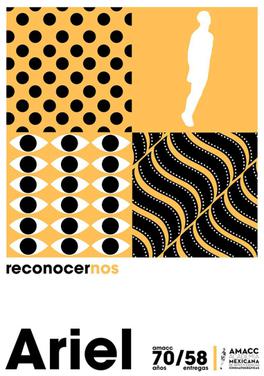Related Research Articles

Mexican cinema dates to the late nineteenth century during the rule of President Porfirio Díaz. Seeing a demonstration of short films in 1896, Díaz immediately saw the importance of documenting his presidency in order to present an ideal image of it. With the outbreak of the Mexican Revolution in 1910, Mexican and foreign makers of silent films seized the opportunity to document its leaders and events. From 1915 onward, Mexican cinema focused on narrative film.

Vicente Fernández Gómez was a Mexican mariachi singer, actor and film producer. Nicknamed "Chente", "El Charro de Huentitán", "El Ídolo de México", and "El Rey de la Música Ranchera", Fernández started his career as a busker, and went on to become a cultural icon, having recorded more than 100 albums and contributing to more than 30 films. His repertoire consisted of rancheras and other Mexican classics such as waltzes.

Bruno Bichir Nájera is a Mexican actor.

María Elena Enríquez Ruiz, known as Helena Rojo, was a Mexican actress and model.
The Ariel Award for Best Actress is an award presented by the Academia Mexicana de Artes y Ciencias Cinematográficas (AMACC) in Mexico. It is given in honor of an actress who has delivered an outstanding performance in a leading role while working within the Mexican film industry. In 1947, the 1st and 2nd Ariel Awards were held, with Dolores del Río and María Félix winning for the films Las Abandonadas and Enamorada, respectively. With the exception of the years 1959 to 1971, when the Ariel Awards were suspended, the award has been given annually. Nominees and winners are determined by a committee formed every year consisting of academy members, previous winners and individuals with at least two Ariel nominations; the committee members submit their votes through the official AMACC website.
The Ariel Award for Best Director is an award presented by the Academia Mexicana de Artes y Ciencias Cinematográficas (AMACC) in Mexico. It is given in honor of a film director who has exhibited outstanding directing while working in the Mexican film industry. In 1947, the 1st and 2nd Ariel Awards were held, with Roberto Gavaldón and Emilio "El Indio" Fernández winning for the films La Barraca and Enamorada, respectively. With the exception of the years 1959 to 1971, when the Ariel Awards were suspended, the award has been given annually. Nominees and winners are determined by a committee formed every year consisting of academy members, previous winners and individuals with at least two Ariel nominations; the committee members submit their votes through the official AMACC website.
Gertrudis is a 1992 Mexican biographical film about the life and execution of Gertrudis Bocanegra, a noted female insurgent of the Mexican War of Independence. It stars Ofelia Medina in the title role and was directed by her brother, Ernesto Medina.

Anabel Gutiérrez Aicua was a Mexican actress and comedian. Her most memorable works included her participation in the film School for Tramps (1955), as well as her appearances on the program Chespirito (1970), playing the character of Doña Espotaverderona in some sketches.

The 58th Ariel Awards ceremony, organized by the Mexican Academy of Film Arts and Sciences (AMACC) took take place on May 28, 2016, at the National Auditorium in Mexico City. During the ceremony, AMACC presented the Ariel Award in 26 categories honoring films released in 2015. The ceremony, was televised in Mexico by Canal Once.
The Ariel Award for Best Actor is an award presented by the Academia Mexicana de Artes y Ciencias Cinematográficas (AMACC) in Mexico. It is given in honor of an actor who has delivered an outstanding performance in a leading role while working within the Mexican film industry. In 1947, the 1st and 2nd Ariel Awards were held, with Domingo Soler and David Silva winning for the films La Barraca and Campeón Sin Corona, respectively. With the exception of the years 1959 to 1971, when the Ariel Awards were suspended, the award has been given annually. Nominees and winners are determined by a committee formed every year consisting of academy members, previous winners and individuals with at least two Ariel nominations; the committee members submit their votes through the official AMACC website.
The Ariel Award for Best Supporting Actor is an award presented by the Academia Mexicana de Artes y Ciencias Cinematográficas (AMACC) in Mexico. It is given in honor of an actor who has delivered an outstanding performance in a supporting role while working within the Mexican film industry. In 1947, the 1st and 2nd Ariel Awards were held, with José Baviera and Fernando Soto winning for the films La Barraca and Campeón Sin Corona, respectively. With the exception of the years 1958 to 1971, when the Ariel Awards were suspended, the award has been given annually. Nominees and winners are determined by a committee formed every year consisting of academy members, previous winners and individuals with at least two Ariel nominations; the committee submit their votes through the official AMACC website.
The Ariel Award for Best Supporting Actress is an award presented by the Academia Mexicana de Artes y Ciencias Cinematográficas (AMACC) in Mexico. It is given in honor of an actor who has delivered an outstanding performance in a supporting role while working within the Mexican film industry. In 1947, the 1st and 2nd Ariel Awards were held, with Lilia Michel winning in both ceremonies for the films Un Beso en la Noche and Vértigo, respectively. With the exception of the years 1959 to 1971, when the Ariel Awards were suspended, the award has been given annually. Nominees and winners are determined by a committee formed every year consisting of academy members, previous winners and individuals with at least two Ariel nominations; the committee members submit their votes through the official AMACC website.

Adriana Paz is a Mexican actress and dancer. She began her artistic career in Spain, shooting commercials and acting in a play. She was recognized for her role as Toña in the Mexican film Rudo y Cursi (2009) with a nomination for the Ariel Award for Best Supporting Actress. She garnered critical praise starring as Miranda in Las Horas Muertas (2013), for which she was awarded Best Actress at the Morelia International Film Festival. She subsequently starred in the TV series Sucedió en Un Día (2010), Capadocia (2010), El Encanto del Aguila (2011), Dios, Inc. (2016), and Vis a vis (2018-2019).

Noé Hernández Álvarez is a Mexican actor. Following his studies of Dramatic Arts at the Autonomous University of the State of Mexico, he became a high school teacher and founded an experimental theater group. After relocating to Mexico City he was offered little roles on several films, including Propiedad Ajena and Sin Nombre. His first lead role was Lino Valdez in Miss Bala, gaining popular recognition and earning a nomination for an Ariel Award for Best Actor.
The 59th Ariel Awards ceremony, organized by the Mexican Academy of Film Arts and Sciences (AMACC) took place on July 11, 2017, at the Palacio de Bellas Artes in Mexico City. During the ceremony, AMACC presented the Ariel Award in 27 categories honoring films released in 2016. The ceremony will be televised in Mexico by Canal 22.
The Ariel Award for Best Ibero-American film is a film award category created in 2000, part of the Ariel Awards, which are presented by the Academia Mexicana de Artes y Ciencias Cinematográficas (AMACC).

The Ariel Award for Best Breakthrough Performance is a recent award presented by the Academia Mexicana de Artes y Ciencias Cinematográficas (AMACC) in Mexico. It has been awarded since the 2019 edition, replacing both breakthrough gender-specific categories. It is awarded in honor of the performance of an acting artist in a breakthrough role.

The Tears is a 2012 Mexican drama film written and directed by Pablo Delgado in his directorial debut. It features Fernando Álvarez Rebeil and Gabriel Santoyo.

González: falsos profetas is a 2013 Mexican thriller film directed by Christian Díaz Pardo and written by Pardo & Fernando del Razo. Starring Harold Torres and Carlos Bardem. The film was named on the shortlist for Mexico's entry for the Academy Award for Best Foreign Language Film at the 87th Academy Awards, but it was not selected.

Human Resources is a 2023 Mexican-Argentine black comedy-drama film co-written and directed by Jesús Magaña Vázquez. It is based on the novel of the same name by Antonio Ortuño. The film stars Pedro de Tavira alongside by Juana Viale, Giuseppe Gamba, Daniel Tovar, Cecilia Ponce, Natalia Barraud, Hernán Sevilla and Camila Murias.
References
- ↑ "Efemérides de espectáculos del 10 de junio". Prensa Mexicana (in Spanish). 10 June 2007. Retrieved 2015-07-01.
- ↑ "Murió Fernando Balzaretti". El Informador. 6 September 1998.
- ↑ "Fernando Balzaretti" (in Spanish). Academia Mexicana de Artes y Ciencias Cinematográficas. Archived from the original on 2015-07-01. Retrieved 2015-06-30.
- ↑ "Fernando Balzaretti define al cine méxicano como un "cine luchón"". El Informador. 1 August 1994.